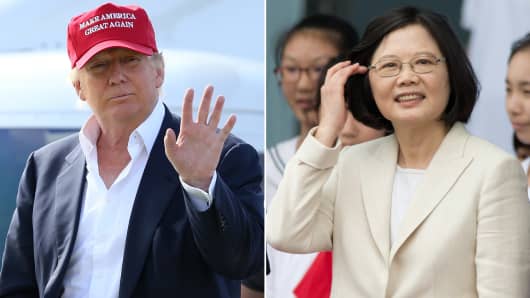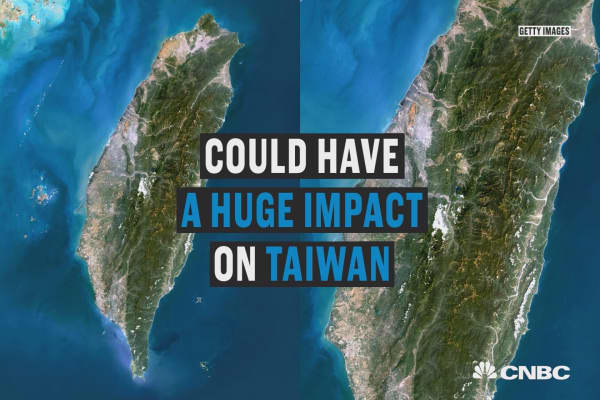By Nyshka Chandran
The U.S. made a move this week to strengthen its relationship with Taiwan, raising eyebrows in China, which strongly opposes countries pursuing ties with the island-nation.

President Donald Trump and Taiwan President Tsai Ing-wen.
The U.S. House Foreign Affairs Committee passed two bills on Tuesday aimed at bolstering "the critical U.S.-Taiwan partnership," according to a statement.
One bill, called the Taiwan Travel Act, encouraged high-level visits between Washington and Taipei "at all levels of government" while the second addressed Taiwan's exclusion from the World Health Organization.
Currently, the State Department enforces self-imposed restrictions on official travel due to the unofficial nature of the bilateral alliance.
Once Sino-U.S. ties were established in 1979, Washington cut off diplomatic links with Taipei in adherence with Beijing's "One China" policy, which recognizes the East Asian island as part of China.
Currently, the State Department enforces self-imposed restrictions on official travel due to the unofficial nature of the bilateral alliance.
Once Sino-U.S. ties were established in 1979, Washington cut off diplomatic links with Taipei in adherence with Beijing's "One China" policy, which recognizes the East Asian island as part of China.
Since then, no Taiwanese leader has formally visited the White House, but that could change if Tuesday's bill gets signed into law.
Washington still maintains cultural, commercial and security ties with Taipei.
A state-run Chinese newspaper denounced the bill's passage, saying it could shake political ties with Chinese dictator Xi Jinping's administration.

China's foreign ministry has not yet answered CNBC's request for comment on the matter.
Since coming into office, President Donald Trump's actions on Taiwan have caused anxiety in the world's second-largest economy.
Washington still maintains cultural, commercial and security ties with Taipei.
A state-run Chinese newspaper denounced the bill's passage, saying it could shake political ties with Chinese dictator Xi Jinping's administration.

China's foreign ministry has not yet answered CNBC's request for comment on the matter.
Since coming into office, President Donald Trump's actions on Taiwan have caused anxiety in the world's second-largest economy.
Those include a 2016 phone-call with Taiwanese President Tsai Ing-wen and a 2017 decision to sell President Tsai's government $1.42 billion in arms.
Aucun commentaire:
Enregistrer un commentaire